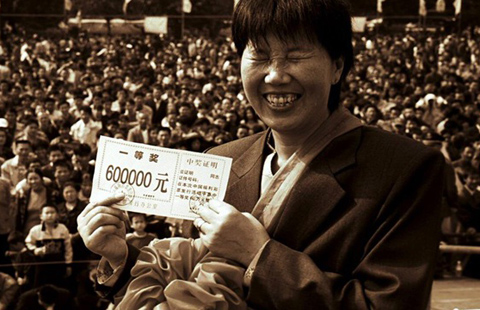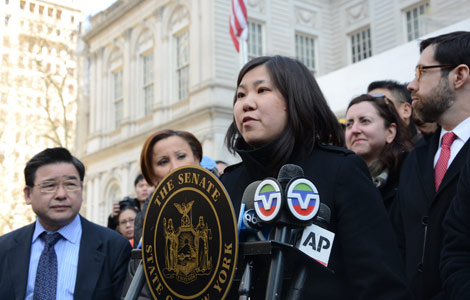China's easing of business rules lauded
Updated: 2015-03-17 10:21
By DONG LESHUO in Washington(China Daily USA)
|
||||||||
China watchers in Washington welcomed the news that the number of small-business registrations in China has risen by almost 50%.
"Generally, it's a very positive sign," Nicholas Lardy, the Anthony M. Solomon Senior Fellow at the Peterson Institute for International Economics, told China Daily on Monday.
Lardy attended a panel discussion at the Center for Strategic and International Studies (CSIS). He was referring to comments made by Premier Li Keqiang at the conclusion of the National People's Congress (NPC) meeting in Beijing on March 15.
Lardy said that all minimum capital requirements to start a liability business in China have been eliminated.
"That gives the entrepreneurs [the ability] to start a liability company more easily than in the past," he said. "It's a step forward. Though it is still not very clear what that 46% really means, it would definitely boost China's entrepreneurship."
Dali L. Yang, a political science professor at the University of Chicago, noted that Li has been emphasizing entrepreneurship. The Chinese government has been reducing the number of government approvals required for new businesses, and the number of enterprise registrations in 2014 was up by 46 percent.
But Li also said that even 7 percent economic growth would be hard to achieve in China this year.
Yang said that restrained outlook has become more accepted in China. "It's about being realistic," Yang said.
Christopher K. Johnson, the Freeman Chair in China Studies at CSIS, said that Li's report put a "heavy emphasis" on innovation. Johnson said that it was clear that "building a high-tech economy would be a key theme for China's 13th Five-Year Plan".
The NPC voted to revise China's Legislation Law on March 15.
The Legislation Law, enacted in 2000 and considered a foundation of China's legal system, regulates how national laws, government regulations and local laws come into shape and which organizations hold the legislative power in the country. The revision expands legislative power from 49 cities in China to 288 nationwide, empowering their legislatures to make local laws.
Guo Linmao, a member of the Legislative Affairs Commission of the NPC Standing Committee, told Xinhua that the resolve of the country's leadership to advance the rule of law has led to heavy pressure on the legislature and its work.
The revised law also underlines the principle of statutory taxation by singling it out in a provision, and makes it clear that a tax can only be levied and tax rate be set with the endorsement of the law.
Of China's 18 existing taxes, only three - individual income tax, corporate income tax, and vehicle and vessel tax - are levied through legislation, while the others are imposed through formal or provisional regulations issued by the State Council.
Also, the investigation of high-ranking officials during the NPC made Yang believe that the anti-corruption drive will not let up. Johnson also said that the anti-corruption campaign "would be sustained".
There are different challenges now, Johnson said. "Passing the river by feeling the stone worked very well in the past. Decision-making inside the system is changing," he said, adding that "there is no reason for pessimism".
On the Silk Road Economic Belt, Johnson said China's emphasis on the "One Belt One Road" policy should not be underestimated. In his last visit to China, he observed that "the government has the message that this is very important. This is a serious issue."
Scott Kennedy, deputy director and Freeman Chair in China Studies, said that "the Silk Road has the chance to become the largest Christmas tree ever, with many gifts hanging for many people. It has a potential to be a way to compensate those industries which aren't doing well."
Johnson said that President Xi Jinping's upcoming official visit to the US in September will be an "interesting moment".
"US public opinion toward China has been significantly improved," Yang said. He said that "opens up potentially some room for the two sides to maneuver".
He also believes "there is a serious commitment to make this relationship work".
Xinhua contributed to this story.

 The CeBIT trade fair opens in Germany
The CeBIT trade fair opens in Germany
 Now and then: Lottery dream fading
Now and then: Lottery dream fading
 Braving the snow for greener pastures
Braving the snow for greener pastures
 Special: Preserve the past to live the future
Special: Preserve the past to live the future
 Bruce Lee's legacy promotes Kungfu in LatAm
Bruce Lee's legacy promotes Kungfu in LatAm
 Germany's Black Forest: a popular holiday destination
Germany's Black Forest: a popular holiday destination
 Push for Lunar New Year school holiday
Push for Lunar New Year school holiday
 Sea of color at Shenzhen race
Sea of color at Shenzhen race
Most Viewed
Editor's Picks

|

|

|

|

|

|
Today's Top News
Mutual respect, interests key to US relations
US targets vocational schools in visa crackdown
Washington pitched to tourist
China, Myanmar investigate deadly bombing in Yunnan: FM
Foreign investment restrictions
to be cut
Taking the fight to the terrorists
Action to be taken if deadly bombing happens again
New bureau set to boost graft fight
US Weekly

|

|







